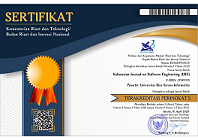Evaluasi E-learning Selama Pandemi Covid-19 Menggunakan Metode Servqual dan Importance Performance Analysis
Abstract
Abstrak
Pandemi COVID-19 di Indonesia mendadak mengubah pembelajaran tatap muka di Universitas Bina Sarana Informatika Kampus Tegal menjadi pembelajaran online berbasis e-learning. Perubahan ini membuat pembelajaran banyak mengalami kendala baik teknis maupun non teknis. Universitas Bina Sarana Informatika Kampus Tegal dalam pengajian pengkajian online berbasis e-learning hendaklah menyelenggarakan menakar tajuk pemenuhan mahasiswa. Penelitian bertujuan untuk memperkirakan tajuk menggunakan e-learning kepuasan mahasiswa di waktu pandemi COVID-19 dengan memerlukan metode Servqual dan Importance Performance Analysis. Hasil pengolahan servqual menyatakan atribut kualitas kegiatan belajar mengajar yang dianggap paling penting oleh mahasiswa adalah atribut Dosen manjawab pertanyaan mahasiswa sedangkan atribut Dosen kredibel pengampu dalam mengampukan kelas waktu pengajian pengkajian online. Berdasarkan perhitungan IKP didapat nilai sebesar 74,68% yang artinya mahasiswa Universitas Bina Sarana Informatika puas atas kinerja para dosen. Untuk itu dosen harus terus memperbaiki dan meningkatkan kinerja kegiatan belajar mengajar agar tingkat kepuasan mahasiswa pada http://elearning.bsi.ac.id/ dapat meningkat.
Kata kunci: COVID-19, IPA, e-learning, Servqual
Abstract
The COVID-19 pandemic in Indonesia suddenly changed face-to-face learning at the Bina Sarana Informatika University, Tegal Campus, into e-learning-based online learning. This change makes learning experience many obstacles, both technical and non-technical. Bina Sarana Informatika University, Tegal Campus, needs to measure the level of student satisfaction in e-learning-based online learning. The purpose of this study was to measure the level of student satisfaction using e-learning during the COVID-19 pandemic using the Servqual and Importance Performance Analysis methods. The results of the servqual processing state that the attributes of the quality of teaching and learning activities that are considered the most important by students are the attributes of the lecturer who answer students' questions, while the attribute of the lecturer is reliable in managing the class during online learning. Based on the calculation of the IKP, a score of 74.68% was obtained, which means that the students of Bina Sarana Informatika University were satisfied with the performance of the lecturers. For this reason, lecturers must continue to improve and improve the performance of teaching and learning activities so that the level of student satisfaction at http://elearning.bsi.ac.id/ can increase.
Keywords: COVID-19, IPA, e-learning, Servqual
Full Text:
PDFReferences
Baiti, A. Al, Suprapto, & Rachmadi, A. (2017). Pengukuran Kualitas Layanan Website Dinas Pendidikan Kota Malang Dengan Menggunakan Metode Webqual 4 . 0 dan IPA. Jurnal Pengembangan Teknologi Informasi Dan Ilmu Komputer, 1(9), 885–892.
Irawati, D. Y., & Jonatan, J. (2020). Evaluasi Kualitas Pembelajaran Online Selama Pandemi Covid-19: Studi Kasus di Fakultas Teknik, Universitas Katolik Darma Cendika. Jurnal Rekayasa Sistem Industri, 9(2), 135–144. https://doi.org/10.26593/jrsi.v9i2.4014.135-144
Kamble, A. A., & Sarangdhar, P. (2015). Assessing Service Quality and Customer Satisfaction in Management Education Using SERVQUAL Model. Journal of Commerce and Management Thought, 6(2), 369. https://doi.org/10.5958/0976-478x.2015.00023.3
Kurniawan, & Cahyadi, R. (2016). Inovasi Kualitas Pelayanan Publik Pemerintah Daerah. Fiat Justisia, 10(3), 569–586.
Leonnard. (2018). The Performance of SERVQUAL to Measure Service Quality. Journal on Efficiency and Responsibility in Education and Science, 11(1), 16–21. https://doi.org/10.7160/eriesj.2018.110103.Introduction
Leonnard, L. (2017). Measuring Grocery Stores Service Quality in Indonesia: a Retail Service Quality Scale Approach. Studies and Scientific Researches. Economics Edition, 26, 32–44. https://doi.org/10.29358/sceco.v0i26.397
Mustaffa, W. S. W., Hamid, M. H. A. @, Bing, K. W., & Rahman, R. A. (2016). Investigating the Relationship among Service Quality, Emotional Satisfaction and Favorable Behavioral Intentions in Higher Education Service Experience. Procedia - Social and Behavioral Sciences, 224(August 2015), 499–507. https://doi.org/10.1016/j.sbspro.2016.05.426
Naidu, P., & Derani, N. E. S. (2016). A Comparative Study on Quality of Education Received by Students of Private Universities versus Public Universities. Procedia Economics and Finance, 35(October 2015), 659–666. https://doi.org/10.1016/s2212-5671(16)00081-2
Parasuraman, A. P., & Berry, L. L. (1988). SERVQUAL: A multiple-item scale for measuring consumer perceptions of service quality. Journal of Retailing, 64(1), 12–40.
Santoso, B. S., & Anwar, M. F. (2015). Analisis Kualitas Website Menggunakan Metode Webqual dan Importance-Performance Analysis (IPA) Pada Situs Kaskus. National Conference on Information Technology and Technical Engineering (CITEE), September, 1–8.
Satuti, J. R., Sunaryanto, S., & Nuris, D. M. (2020). Does Student Satisfaction Mediate the Correlation between E-learning Service Quality, Academic Engagement and Academic Achievement? Jabe (Journal of Accounting and Business Education), 5(1), 38. https://doi.org/10.26675/jabe.v5i1.12699
Siregar, S. (2016). Statistika Deskriptif Untuk Penelitian : Dilengkapi Perhitungan Manual dan Aplikasi SPSS Versi 17 (R. S. Grafis (ed.); 5th ed.). Rajawali Pers.
Soares, M. C., Novaski, O., & Anholon, R. (2017). SERVQUAL model applied to higher education public administrative services. Brazilian Journal of Operations & Production Management, 14(3), 338. https://doi.org/10.14488/bjopm.2017.v14.n3.a7
Stodnick, M., & Rogers, P. (2008). Using SERVQUAL to Measure the Quality of the Classroom Experience. Decision Sciences Journal of Innovative Education, 6(1), 115–133. https://doi.org/10.1111/j.1540-4609.2007.00162.x
Uppal, M. A., Ali, S., & Gulliver, S. R. (2018). Factors determining e-learning service quality. British Journal of Educational Technology, 49(3), 412–426. https://doi.org/10.1111/bjet.12552
Wagner, A., Merino, E., Martinelli, M., Polacinski, É., Wegner, R. da S., & Godoy, e L. P. (2017). The Quality of Services in A Higher Education Institution: An Evaluation for The Integration of AHP, SERVQUAL and QFD Methods. Disciplinarium Scientia, 12(1), 109–129.
Warjiyono, & Hellyana, C. (2019). An Analysis &Measurement of Website Quality Using The WebQual 4.0 And Importance Performance Analysis (IPA) Method (A Case Study Of Jagalempenivillage Brebes). International Conference On Advance And Scientific Innovation (ICASI). https://doi.org/10.4108/eai.18-7-2019.2288532
Warjiyono, Rais, A. N., Fandhilah, Erawati, W., Handayani, N., & Mayatopani, H. (2020). Webqual and Importance Performance Analysis Method: The Evaluation of Tegal City’s Public Service Information System Web Quality. International Conference on Informatics and Computing (ICIC). https://ieeexplore.ieee.org/document/9288518
DOI: https://doi.org/10.31294/ijse.v7i2.11213

This work is licensed under a Creative Commons Attribution-NonCommercial-ShareAlike 4.0 International License.
ISSN : 2714-9935


Published by LPPM Universitas Bina Sarana Informatika
Jl. Kramat Raya No.98, Kwitang, Kec. Senen, Kota Jakarta Pusat, DKI Jakarta 10450
This work is licensed under a Creative Commons Attribution-ShareAlike 4.0 International License









